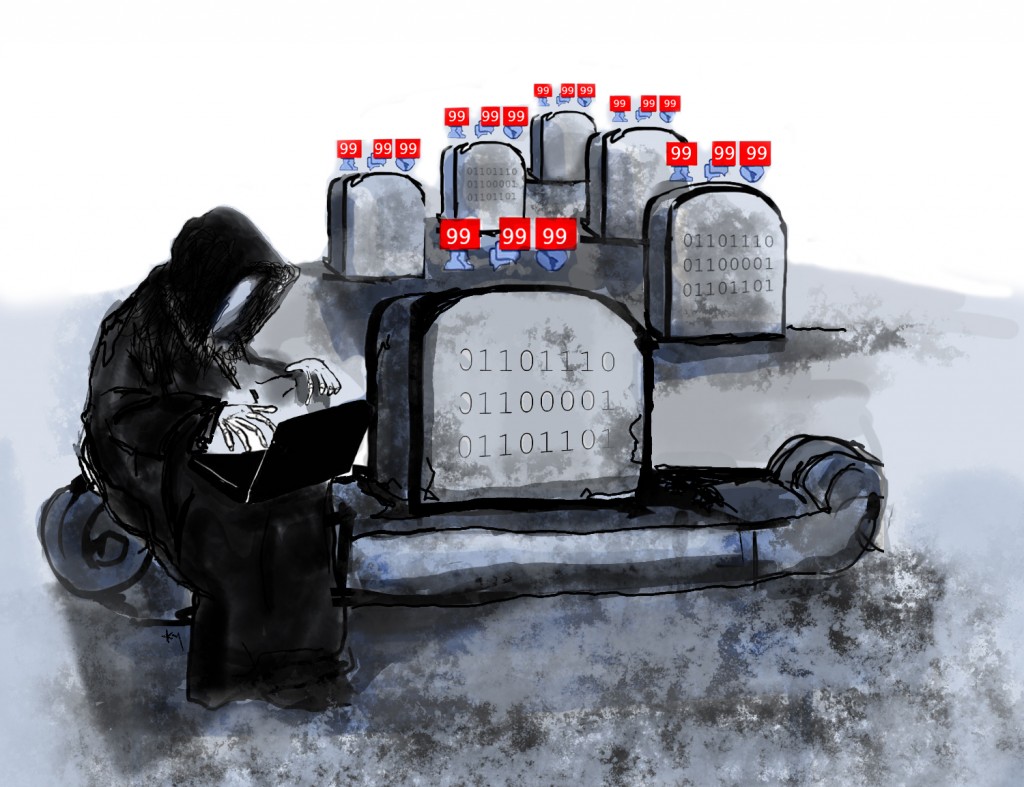
[table]
| Social media should keep deceased sacred
Written by Jen Schwartz Is it rude to unfriend dead people on social media sites? I sure hope not because I feel like I’m reaching my wit’s end. Every time the unfortunate news of someone’s untimely demise circulates I feel like the first thing people do is log on to their computers and post on the deceased’s Facebook wall. While of course mourning is an important stage in the grieving process, I don’t feel like social media is necessarily the most appropriate forum. Aside from being incredibly creepy, writing messages to the dead online just doesn’t seem genuine. Shortly after someone passes it feels like their Facebook wall turns into a competition to see who is grieving the most. I’ve seen posts where people admit that they weren’t very close to the deceased person but wish they had had a chance to get to know them better. Where were those sentiments of wanting a closer relationship with that person when they were alive? I understand that news of even an acquaintance passing on can be sad, because death in general is sad, but does it really bring people so much melancholy that they feel the need to write a quick “You seemed nice, R.I.P.” and publish it online? The whole act is really just a more depressing version of writing “Have a great summer” in someone’s yearbook — the perpetrator doesn’t really have anything important to say but they want to say something anyway to make it seem like they care more than they actually do, which is borderline offensive. Of course, not all of those who post on the Facebook walls of the deceased are merely acquaintances and I’ve seen many posts from those who were rather close to the departed, but choosing to grieve in such a public forum still comes across as rather tacky. Doesn’t sharing detailed intimate memories about someone inherently make them less intimate? Furthermore, I wonder what these people expect to gain from posting on someone’s Facebook wall who is no longer alive to manage it. Assuming there is a heaven, do you really think the first few days of being up there someone’s gonna be checking their Facebook to see who misses them? If closure is what they’re after, I suggest making a visit to the deceased’s grave. We may live in a digital world but I truly believe that some things should remain sacred. |
The merits of a virtual headstone
Written by Emme Raus, contributor People go to the trouble of visiting the gravesites of family members: talking aloud to no one, touching the tombstone, perhaps leaving some flowers. So why should it be considered strange to pay the same attention to those who have passed and left their marker on Facebook? For some, it can be therapeutic to write on a deceased person’s Facebook wall on their birthday in simple remembrance. For others, it is a way to finally achieve that peace of mind by saying what you’ve always wanted to say to that person but were robbed of the chance to. When celebrities pass away, social media sites are usually the first to know and comment on it. Celebrities are people who most of us have grown up with and feel connected to. By writing something on their wall, you provide a thoughtful message for not only fans to see but also their families and friends who are able to take into account how many people the celebrity impacted and how much of a blessing it is to have the whole world mourn with them. But it’s not just famous people who continue to linger online. Posting on the profile of a deceased relative provides a bonding experience for families who live apart to easily reminisce over a loved one. For instance, when flying back from grandma’s funeral to the four corners of the country, relatives can post photos of her wedding day, videos of her helping blow out the candles on her grandchild’s birthday cake, her signature red velvet whoopie pie recipe or just small, heartfelt messages of how important she was to all of them. Personally, I’ve found that visiting the Facebook page of a dead person helps to wipe the dust off a box of good memories. My mother and our golden retriever Ben used to be a volunteer therapy dog team. Before Ben passed away, my mother wrote a children’s book about their work and created a Facebook profile page for Ben to help market the book and reach out to readers. Now, years later, she still gets postings from fans who either read the book or met Ben and felt compelled to share their positive experiences of him online. So don’t be afraid to walk through the virtual graveyard on Facebook. Sure, it sounds ominous, but when you put it into perspective, it’s just the modern way of paying your respects to those who are missed. |
[/table]





















